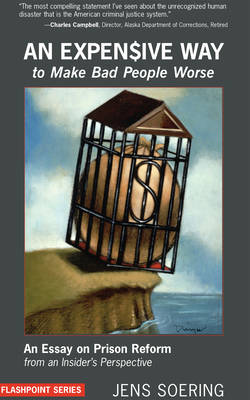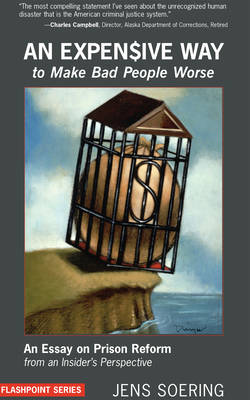
- Afhalen na 1 uur in een winkel met voorraad
- Gratis thuislevering in België vanaf € 30
- Ruim aanbod met 7 miljoen producten
- Afhalen na 1 uur in een winkel met voorraad
- Gratis thuislevering in België vanaf € 30
- Ruim aanbod met 7 miljoen producten
Zoeken
An Expensive Way to Make Bad People Worse
An Essay on Prison Reform from an Insider's Perspective
Jens Soering
€ 16,95
+ 33 punten
Omschrijving
The United States has more people locked away in prison per capita than any other country. Prison building is a multi-billion-dollar industry, and in some states more money is spent on prisons and prisoners than on education. Nearly one quarter of all prison inmates worldwide are housed in U.S. jails or penitentiaries, even though the United States has only five percent of the world's population. Yet, in spite of the vast amount of resources spent on locking people up and the number of people in prison, the United States leads the developed world in the number of homicides and violent assaults. For the last eighteen years, Jens Soering has experienced the inside of many different prison environments, from a youth remand center in London to America's notorious Supermax prisons, to medium-security institutions. What he has seen and experienced has convinced him that not only do prisons not rehabilitate prisoners who may be useful for society once their sentence has ended, but prisons turn petty criminals into hardened convicts--all at enormous expense to society. Meanwhile, other nations control their crime rates at a fraction of the cost of the United States correctional system. Soering does not argue that prisons should not exist or dispute that there are people who need to be locked away. His book is not an indictment of the legal system that lands many people in prison. Instead, An Expensive Way to Make Bad People Worse offers a mainly monetary analysis of why it is absurd fiscal policy to lock people up so often and for so long.
Specificaties
Betrokkenen
- Auteur(s):
- Uitgeverij:
Inhoud
- Aantal bladzijden:
- 128
- Taal:
- Engels
- Reeks:
- Reeksnummer:
- nr. 1
Eigenschappen
- Productcode (EAN):
- 9781590560761
- Verschijningsdatum:
- 1/09/2004
- Uitvoering:
- Paperback
- Formaat:
- Trade paperback (VS)
- Afmetingen:
- 127 mm x 204 mm
- Gewicht:
- 158 g

Alleen bij Standaard Boekhandel
+ 33 punten op je klantenkaart van Standaard Boekhandel
Beoordelingen
We publiceren alleen reviews die voldoen aan de voorwaarden voor reviews. Bekijk onze voorwaarden voor reviews.











